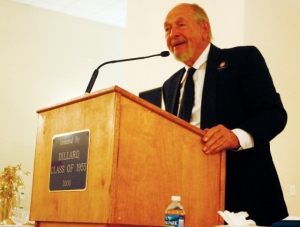NAACP gathers for annual Freedom Fund Banquet
By Ty Johnson
Published in News on September 24, 2012 1:46 PM

News-Argus/TY JOHNSON
Civil Rights activist Robert Zellner addresses those gathered for the NAACP Freedom Fund Banquet.
The keynote speaker at the NAACP Freedom Fund Banquet at the Dillard Alumni Cultural Center Saturday evening had been arrested 18 times in seven states.
But this was no speech from a man who had seen the error of his ways and chosen to change his life. It was a spoken memoir of how he, and civil rights activists like him, had worked to change society itself.
Robert Zellner's rap sheet, which dates back to the Civil Rights Movement, wasn't the focus of his lecture, however.
Instead, Zellner spoke of the movement in government that he feels is threatening the accomplishments of his generation and how citizens can work to defeat it.
He spoke to members and guests of the Goldsboro/Wayne Branch of the National Association for the Advancement of Colored People during their annual banquet emceed by Brandi Matthews and featuring musical performances by Shelia Gregory and Aaliyah Tate. Two recipients of the Geneva Hamilton Scholarship were also recognized, but the theme of the evening centered on suffrage.
Rev. William Barber, the president of the state NAACP chapter, spoke of the urgency with which citizens should carry their votes to the polls this year, highlighting changes in the General Assembly two years ago that led to budgets he felt were detrimental to education and voting rights.
"This is the greatest attack on voting rights since the 1800s," he said during his opening address.
Zellner continued to stress the importance of voting by presenting his experiences during the Civil Rights Movement as his comrades were literally dying to vote. Zellner knew one of the victims of the 16th Street Baptist Church bombing in Birmingham, Ala., and a host of other martyrs in the movement, including Martin Luther King Jr.
Zellner explained that the accomplishments achieved during Reconstruction following the Civil War -- which included suffrage for black men -- were rolled back by the poll taxes and literacy tests that were written into state constitutions in Southern states.
Born in southern Alabama as the son and grandson of Ku Klux Klan members, Zellner took an active part in championing for the Civil Rights and Voting Rights acts in the 1960s, but said those landmark laws were in danger of being overturned by recent surges from Republicans.
"It's being challenged right now," he said, noting that laws requiring identification were making it more difficult for voters.
He also said that challenges to same-day voter registration and Sunday voting were aimed straight at black churches.
The Wayne County Board of Elections voted 2-1 against having a Sunday voting date in August, but the state board overrode that decision in the first week of September, resulting in polls being open Oct. 28 from 1 to 5 p.m.
Zellner said not putting a premium on the right to vote has allowed it to come under fire.
"We've lost the focus of importance and on the lives that it took to get the right to vote," he said.
That's why he is still working, much in the same manner he was when he was the first white Southerner to serve as field secretary for the Student Nonviolent Coordinating Committee.
Living in Wilson, he is working to install coalitions between working and middle-class blacks and whites in hopes of creating voting blocks capable of turning back the Republican tide in the state and federal legislatures.
Zellner's story has been told in his memoir, "The Wrong Side of Murder Creek: A White Southerner in the Freedom Movement," and will also be dramatized in an upcoming Spike Lee film, "Son of the South."
